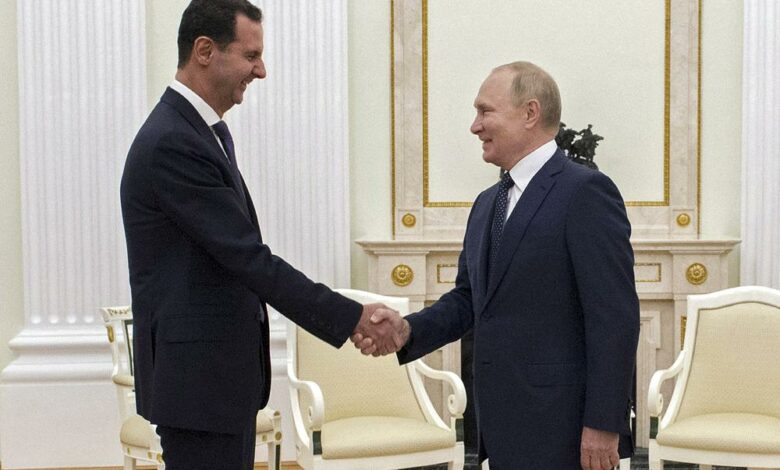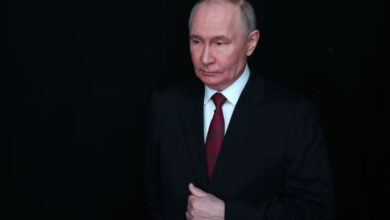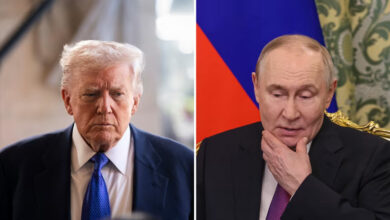
DAMASCUS, Syria (AP) — Russian President Vladimir Putin criticized the presence of foreign troops in Syria, saying they are there against the will of the Syrian government and are blocking the consolidation of the war-torn country, the Kremlin said Tuesday.
Putin was referring to hundreds of US troops stationed in eastern Syria and working with Kurdish-led fighters in battling the militant Islamic State group, as well as Turkish forces in northern Syria. Speaking during a rare meeting in Moscow on Monday night with his Syrian counterpart Bashar Assad, he said the presence of the foreigners is illegal because they don’t have permission to be there from the United Nations or Syria’s government.
Russia joined Syria’s 10-year conflict in September 2015, when the Syrian military appeared close to collapse, and has since helped in tipping the balance of power in favor of Assad, whose forces now control much of the country. Hundreds of Russian troops are deployed across Syria and they also have a military air base along Syria’s Mediterranean coast.
Assad has rarely made trips abroad in the past decade since Syria’s conflict began, except to visit key allies Russia and Iran. Assad and Putin discussed cooperation between their armies and ways to continue operations to gain control of the last rebel-held areas in Syria, state media in Damascus reported.
Putin later announced he was going into self-isolation because of coronavirus cases in his inner circle. Assad and his wife tested positive to coronavirus in March, and recovered three weeks later.
It was the first meeting between the two allies since they held a summit in the Syrian capital in January last year. The two also met in the Black Sea resort of Sochi in 2017 and in Moscow in 2015. Syrian state TV described Monday’s meeting as “long” and said the two were later joined by Syria’s foreign minister and Russia’s defense minister to discuss mutual relations and fighting terrorism.
“This clearly violates international law and doesn’t allow you to make maximum efforts to consolidate the country,” Putin was quoted as telling Assad about the foreign forces, according to a statement released by the Kremlin.
“Only a consolidation of all forces in Syria will allow the country to get on its feet and start steady development, moving forward,” Putin said.
Putin and Assad also discussed the political process in the war-torn country, the TV said.
In recent weeks, Syrian opposition activists said that Russian warplanes have been carrying out strikes on the northwestern province of Idlib, the last major rebel stronghold in the country. The region is home to some 4 million people, many of them internally displaced by the conflict.
Last week, a Russian-negotiated cease-fire deal went into effect to end a government siege and intense fighting in the southern city of Daraa. The deal brought areas held by the rebels in the city under government control for the first time since 2013.
“We have the intention in Syria as a government and institutions to move in parallel between the liberation of land and the political process,” the TV also quoted Assad as saying.
The TV said the during the meeting, the two leaders discussed cooperation between their armies “in fighting terrorism and the continuation of liberating lands held by terrorists.” Assad’s government refers to all armed opposition groups as terrorists.
The Russian president said “our joint efforts have liberated the main, overwhelming territory of the Syrian Republic.” Speaking to Assad, Putin added that “the terrorists have suffered very serious, significant damage, and the Syrian government, headed by you, controls 90 percent of the territory.”
In Geneva, a team of U.N. investigators gave a strikingly different view of the situation. They said that after Assad won a fourth seven-year term this year, “there seems to be no moves to unite the country or seek reconciliation” and that the country was not safe for refugees to return.
In a report, the U.N. Syria Commission of Inquiry said that arbitrary and incommunicado detentions by government forces have continued and the economic situation has deteriorated dramatically, along with a recent surge in fighting.
“The overall situation in Syria looks increasingly bleak,” Commissioner Karen Koning AbuZayd said.
Syria’s conflict began in March 2011 with anti-government protests and later turned into a civil war that has killed half a million people and displaced half the country’s pre-war population of 23 million, including 5 million who are refugees outside the country.
___
Litvinova reported from Moscow. Associated Press writer Jamey Keaten contributed to this report from Geneva.




